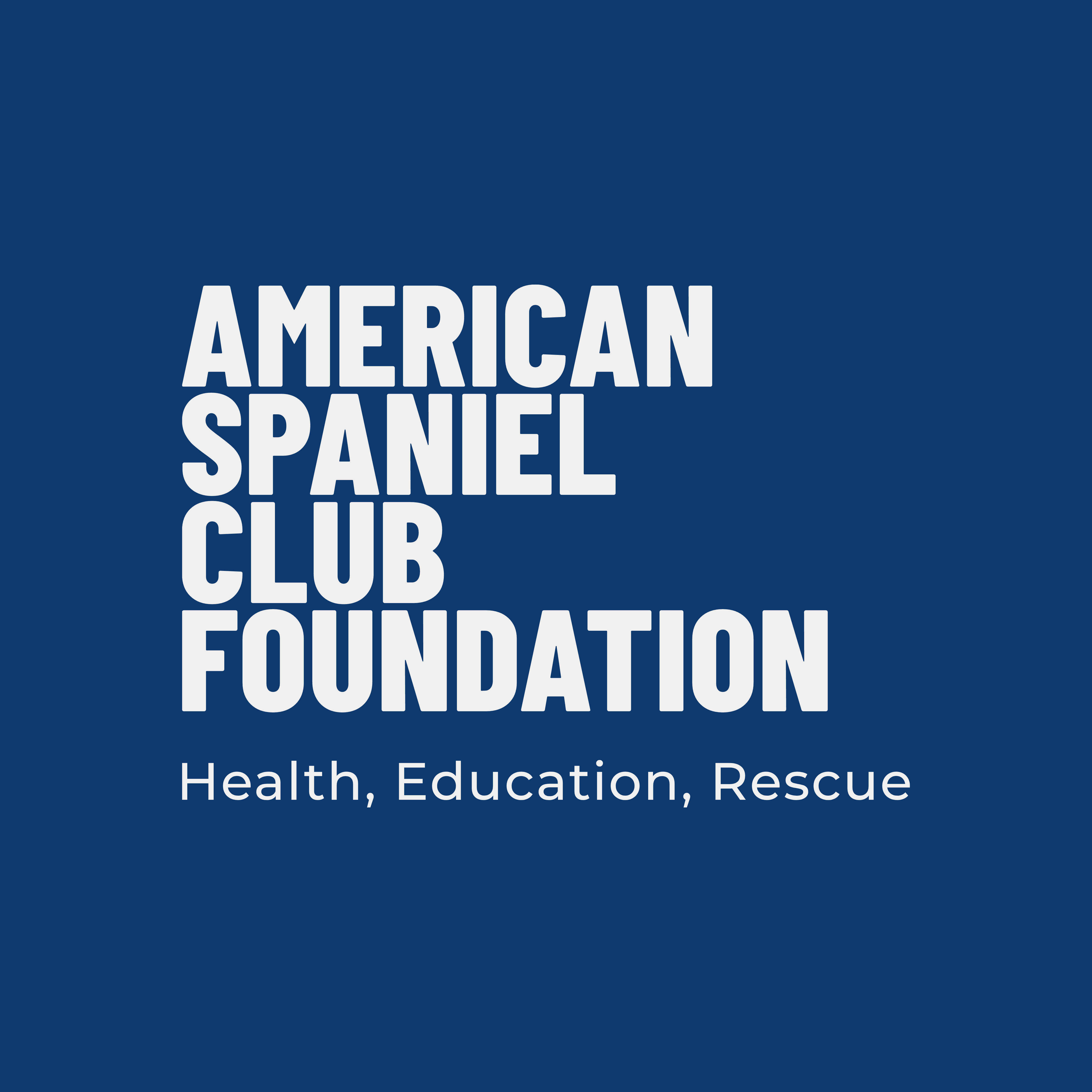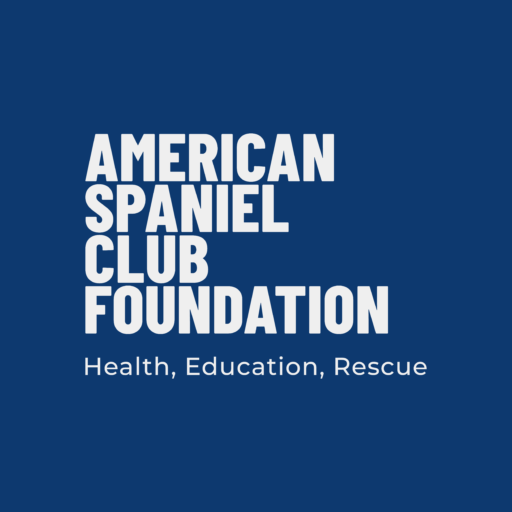Update on Genetic Testing
In response to the recent Foundation survey on potential free health and research seminars we could provide to the Cocker fancy, there were some side posts on the validity of DNA genetic testing and some expressed frustration with inconsistent results or the meaning of the results. Last year, at the request of the ASC Board, the ASC Foundation looked into the many DNA test kits out on the market and sought DNA researcher opinions on their viability for breeding programs.
What we found was that while many dog DNA test kit manufacturers like Embark or Wisdom claim that their tests are accurate there are many veterinarians and genetic experts that are not ready to stamp these kits with a seal of accuracy. While part of the problem is there is no industry standard for these tests, the real concern is in large part due to the possibly inaccurate LINKAGE map testing they use, versus testing for a specific mutation using ASSAY techniques.
Embark and Widsom are two testing labs offering LINKAGE testing. For example, Embark LINKAGE tests use a dog’s DNA to test for every possible genetic link known in dogs and then inform you about them as related to your specific dog. These results are not necessarily predictive of a dog’s true genotype. Unlike a gene-specific ASSAY test, which looks for specific mutations of interest to a breeder, a LINKAGE test does not. Embark on their website clearly states that they are focused on breed identification, and the vast majority of their clients use them to test for breed percentages in their mixed breed dogs to understand their ancestry. The geneticists who responded to our inquiry preferred Wisdom to Embark but much-preferred testing companies that provided the preferred ASSAY mutation-specific testing.
Among these ASSAY testing companies are Optigen GenSol, and Paw Prints. Optigen is owned by Mars and specializes in tests for many eye diseases and is the choice of most geneticists we surveyed. Optigen has the most accreditations and DNA archives. Paw Prints is now owned by Neogen and only does ASSAY breed-specific tests for identified genetic issues. Paw Print is well regarded by the geneticists who responded to our inquiries, who cited Paw Print’s accreditations and heavy Ph.D. geneticist experienced executive team. GenSol targets breeders, pet owners, and veterinarians with breed-specific and general ASSAY testing.
The ASC Foundation’s position on DNA genetic testing is that dog owners should talk to their veterinarian if the goal is to identify potential hereditary disorders or health conditions in their breeding stock.
ASC Foundation 2023 Health Survey Results
We have the survey tabulations ready for your review. The intent of the survey was to identify health related issues that may be experienced by our Cocker companions. Understanding the health issues faced by our Cocker Spaniels and their owners will allow the ASC Foundation to focus research and other efforts with a goal of improving the health of our Cockers.
Just to refresh your memory, a general list of Canine health issues was used to construct this survey, not necessarily those unique to Cockers. Similar surveys by other parent breed club were reviewed for information as the survey was constructed. The American Kennel Club assisted the ASC Foundation by distributing a link to the survey to anyone that had registered a Cocker Spaniel with the American Kennel Club in the last approximately 20 years.
A total of 1,558 survey responses were received. Data on 3,425 males and 4480 bitches was received for a total of 7905 individual Cockers. The results are presented by general areas or conditions in the same manner that the survey was constructed.
We would like to thank all survey participants. Your decision to participate will aid the American Spaniel Club Foundation as we work to improve the quality of life for our Cocker companions. Thank you
If you have questions, please send questions to askthefoundation@gmail.com
Click on heading below to access the report.
Foundation Health Survey Final 2023
The Research Universe – Introduction
We know that your dog’s health is important to you. Except for the current Cataract Research with the University of Pennsylvania which focuses on cocker spaniels, much of the research we fund is sponsored by the AKC Canine Health Foundation. By joining in with other major research on issues that affect our dogs, our funds can go further. When possible, we will search for cocker-specific research as well.
We will continually expand and enhance this section with other diseases and research associated so that the information here can be helpful whether your dog is healthy or affected by a disease. Please remember that the information contained here cannot substitute for the advice of your veterinarian but we hope will make you a more informed breeder or owner.
Reports of nonhereditary canine dilated cardiomyopathy and of certain dog foods and ingredients.
The Food and Drug Administration announced on Dec. 23, 2022, that the agency plans to end routine updates on the investigation of case reports of nonhereditary canine dilated cardiomyopathy and of certain dog foods and ingredients.
“While adverse event numbers can be a potential signal of an issue with an FDA regulated product, by themselves, they do not supply sufficient data to establish a causal relationship with reported product(s). FDA continues to encourage research and collaboration by academia, veterinarians, and industry,” the agency stated. Further information can be found here.
Hemangiosarcoma
Hemangiosarcoma is an aggressive and common cancer in dogs. It can develop in any tissue or organ, but most commonly affects the spleen, right atrium of the heart, and the skin.
Since 1995, CHF and its donors have invested over $4.1 million in 29 grants in understanding mechanisms and causes, new targets for treatment, and early diagnostics for canine hemangiosarcoma, aggressive cancer in dogs. CHF, along with its donors, continues to address this devastating disease through this initiative launched in 2018.
For more information about this disease and current research click on this link.
AKC Canine Health Foundation | Hemangiosarcoma Research Initiative (akcchf.org)
Epilepsy
Epilepsy affects one in every 100 dogs and refers to recurrent seizures resulting from an abnormality in brain function. The condition can be inherited (genetic epilepsy), caused by structural problems in the brain (symptomatic epilepsy), or may be of unknown cause (idiopathic epilepsy). Determination of the appropriate treatment for canine epilepsy, as well as prognosis for the condition, depends on an accurate diagnosis of the type and cause of seizures.
Since 1995, CHF and its donors have invested more than $1.47 million in 21 grants to study canine epilepsy. Ongoing studies are exploring the use and effects of dietary supplements in the treatment of canine epilepsy, underlying genetics and disease mechanisms, and the role of the gastrointestinal tract and microbiome in the development and treatment of this disease.
For more information about this disease and current research click on this link
AKC Canine Health Foundation | Epilepsy Research Initiative (akcchf.org)
General Infectious Diseases
Infectious diseases are potentially life-threatening and can affect all dogs. Many of these diseases are also zoonotic, meaning they can affect humans, too. Being aware of key clinical signs and preventive measures is important to keep your dog healthy.
For more information about infectious diseases, how they can affect your dog, and research in progress click on this link.
AKC Canine Health Foundation | Current Topics in Infectious Disease (akcchf.org)
Xylitol Is Poisonous To Dogs
What is xylitol? Xylitol is a naturally occurring alcohol found in most plant materials. It is used as a sugar substitute in “sugar-free” chewing gums, mints, and other foods because it has fewer calories and a lower glycemic index than common table sugar (sucrose). It is also used as a medicine, a source of energy in tube feeding formulas for people, and in products that treat dry mouth and tooth decay.
For more information on how Xylitol is toxic for dogs click on this link.
https://www.akcchf.org/educational-resources/library/AKC-CHF-Xylitol-Information-for-Dog-Owners.pdf



